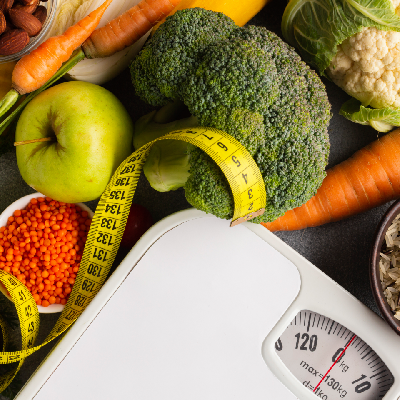7 Day Diet Plan for Thyroid Patients
Day 1
- Early morning: 1 glass of lemon water
- Breakfast: 1 stuffed paneer, besan chilla, + green chutney
- Mid-morning: 1 mango or 200g of watermelon
- Lunch: 1 Chapati (Gulten Free) + 2 Katori Mix Dal + Salad + Curd
- Evening Snack: 20g Makhana
- Dinner: 170g Moong Dal Khichdi
Day 2
- Early Morning: 1 Glass Jeera Water / Apple Cider Vinegar
- Breakfast: 1 Stuffed Besan Chilla + Green Chutney
- Mid Morning: 1 Glass Lemon Chia Seeds Water
- Lunch: 140-160g Brown Rice + Rajma + Salad
- Evening Snack: 20g Makhana
- Dinner: 1 Gluten Free Aata Chapati + Paneer Bhurji + Salad 120 g
- Green Tea: 30Min After Dinner
Day 3
- Early Morning: 1 Cup Spearmint Tea
- Breakfast: 3 Idli + Sambar / 2nd Option Overnight Oatmeal (40 g Oats With Milk + Fruits + 1tbsp Honey
- Lunch: 1 Chapati With Fav Sabji +100g Salad
- Evening Snack: 1 Glass Coconut Water
- Dinner: 160g Moong Dal Khichdi
- After Dinner 1 Cup Green Tea
Day 4
- Breakfast (9Am): 1 stuffed Vegetable Chilla + Green Chutney
- Mid-morning (11:30Am): 1 mango
- Lunch (1:30-2Pm):1 Chapati (Gulten Free) + 1 Katori Chana Dal + 160g Cucumber
- Evening (5Pm): Option 1: 1 Glass Chai Seeds Lemon Water
- Option 2: 1 Glass Buttermilk
- Option 3: 1 Glass Coconut Water
- Dinner (7-8 Pm): 40g Masala Oats With Veggies or 160g Vegetable Daliya
Day 5
- Empty Stomach: 1Glass Jeera Water
- Breakfast: 140-160g Poha
- Mid-morning (11:30Am): 1 Glass Lemon Water
- Lunch (1:30-2Pm): 1-2 Chapati With Paneer Sabji + Salad 160g
- Evening Snack (5Pm): 20g Makhana
- Dinner: Option1: 2 Slice Bread Vegetable Sandwich
- Option2: 40g Masala Oats With Veggies
Day 6
- Early Morning: 1 Cup Spearmint Tea
- Breakfast: 1 Stuffed Besan Chilla + Green Chutney
- Lunch: 1 Chapati with Fav Sabji + Salad
- Evening Snack: 200g Fruits
- Dinner: 160g Vegetable Daliya / 2 Slice Vegetable Sandwich
- Green Tea: 30-40 Min After Dinner
Day 7
- Early Morning: 1 Cup Spearmint Tea
- Breakfast: 160g Vegetable Poha
- Lunch: 150g Rice + 180g Rajma + 100g Salad
- Evening Snack: 20g Makhana
- Dinner: 160g Vermicelli Upma
Frequently Asked Questions
1. Can diet affect thyroid function?
Yes, diet can significantly impact thyroid function. Nutrients like iodine, selenium, and zinc are essential for thyroid health. Consuming a balanced diet rich in these nutrients can help support thyroid function.
2. What foods should be avoided for thyroid health?
Thyroid patients should avoid foods high in goitrogens, such as soy products, cruciferous vegetables (like cabbage, broccoli, and cauliflower), and gluten. Excessive consumption of processed foods and high-sugar items should also be avoided.
3. Can hypothyroidism be managed solely through diet?
While a healthy diet can help manage symptoms and support overall thyroid function, medication prescribed by a doctor is usually necessary to manage hypothyroidism effectively.
4. Are there specific foods that help with hypothyroidism?
Yes, foods rich in iodine (like seaweed), selenium (like Brazil nuts), and zinc (like pumpkin seeds) can be beneficial. Additionally, anti-inflammatory foods like berries, fatty fish, and leafy greens can help support thyroid health.
5. Is exercise important for thyroid patients?
Exercise is important for overall health and can help manage the symptoms of thyroid disorders. Regular physical activity can boost metabolism, improve mood, and support weight management.
6. How often should thyroid function be tested?
Thyroid function should be tested as recommended by your healthcare provider. For those with thyroid disorders, regular monitoring (usually every 6–12 months) is essential to ensure that the condition is well managed.
7. Can supplements help with thyroid health?
Certain supplements, like iodine, selenium, and vitamin D, can support thyroid health. However, it’s important to consult with a healthcare provider before starting any supplements, as excessive intake can be harmful.
8. What is the role of stress in thyroid health?
Stress can negatively impact thyroid function and overall health. Managing stress through practices like meditation, yoga, and regular exercise can support thyroid health.
9. Can thyroid disorders cause weight gain?
Yes, hypothyroidism can slow down metabolism, leading to weight gain. A balanced diet and regular exercise can help manage weight.
10. Are there any natural remedies for thyroid disorders?
While some natural remedies and lifestyle changes can support thyroid health, they should complement, not replace, conventional medical treatments. Always consult with a healthcare provider before trying new remedies.












